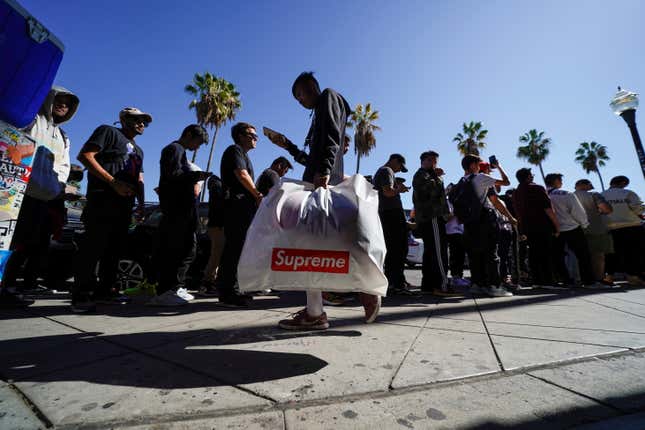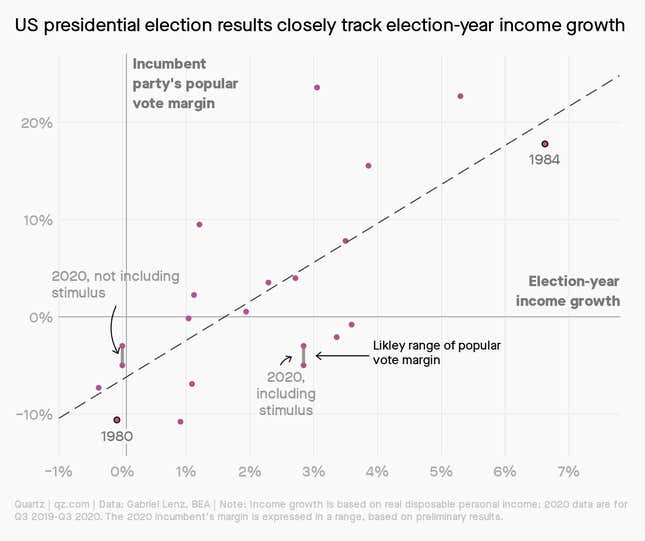Good morning, Quartz readers!
Here’s what you need to know
Singles’ Day has already netted $56 billion. Alibaba’s shopping holiday, typically held on Nov. 11, started on Nov. 1 this year, and sales have already topped last year’s one-day total. However, the company’s stock was down 9% over concerns about China’s proposed anti-monopoly rules for online platforms, delivered a week after regulators forced the delay of Alibaba’s financial affiliate Ant Group’s IPO.
The EU laid out its antitrust case against Amazon. European Union regulators said the US-based retail behemoth uses nonpublic data from merchants that sell on its platform to create copies of their products, in violation of competition laws. Meanwhile, India’s Future Retail asked the Delhi High Court to prevent Amazon from “derailing” its sale to Reliance Retail.
A Taiwanese chip maker approved a new $3.5 billion US factory. Taiwan Semiconductor Manufacturing Company, a major Apple supplier, plans to build a manufacturing site in Arizona, likely to assuage US concerns over reliance on foreign tech. Separately, Apple unveiled the first devices to use its M1 chips, promising significant performance improvement over models with Intel chips.
Huawei found a buyer for its budget smartphone unit. Handset distributor Digital China and the government of Shenzhen will lead a consortium in purchasing Honor for 100 billion yuan ($15.2 billion), Reuters reports.
The US presidential transition is sort of moving along. Current president Donald Trump maintains—often in all caps—that he is the true winner of a rigged election, and while most GOP politicians are still backing him, some are starting to indicate that there needs to be a deadline for Trump to produce evidence of wrongdoing. In the Supreme Court, a Republican challenge to the Affordable Care Act looks like it will be blocked.
The rebirth of cool

Pop quiz, hot shot. Those shoes you think are cool—what kind of cool are they?
🕶 Niche cool: Does a small group of people believe that those shoes are cool because the masses haven’t discovered them yet? Mukesh Ambani’s Ajio is trying to tap into the sneaker collector niche, and Indian sneakerheads are skeptical.
🛒 Mass cool: Are those shoes coveted by mainstream feet? Though it has firmly niche-cool roots, Supreme, which was just acquired by VF Corp—owner of brands such as Vans, The North Face, Timberland, and Dickies—has been skating towards mass cool status for years.
Charting income growth’s effect on US voting
US economic fortunes have been influencing presidential outcomes since the times of George Washington. Over the past two and a half centuries, Americans have tended to vote out incumbents when the economy sours, and rewarded them with another term when it’s thriving, a phenomenon that political scientists call “retrospective economic voting.”

The state of the economy is not the only factor that matters, of course. As the US becomes more politically polarized, there is some evidence that partisanship is playing a bigger role in elections, and retrospective voting a smaller one. Still, looking at the 2020 election through the lens of the economy offers a useful starting point for gauging the result. Ana Campoy breaks it down.
Climate tech funding, by the numbers
In 2019, nearly six cents of every venture dollar invested went into climate tech, according to PwC. The category is broad, and just getting broader, including everything from data center energy efficiency algorithms to electric airplanes.
$10-16 billion: Amount that 500 climate tech companies collected from investors last year, most of it in the US, China, and Europe
20: Countries that have net-zero targets on the books (compared to zero in 2006)
120: Countries working on adopting some form of carbon neutrality
300: Major global companies committed to carbon neutrality by 2050
200: Institutional investors managing $29 trillion in assets who have asked executives at top US greenhouse gas emitters to disclose their plans to limit global warming
Is climate tech booming, or on its way to another bust? Read more in our guide to climate tech’s second shot.
✦ It’s Members Week! We’re celebrating two years of Quartz membership, and we’d like to invite you to invest in your future reader satisfaction at 50% off, using code MEMBERSWEEK. (This offer does not apply to Quartz Japan memberships.)
Surprising discoveries
“Lockdown” is the word of the year. Collins Dictionary found use of the noun soared from 4,000 instances last year to over a quarter of a million in 2020.
Female mongooses go to war to find love. They form battle lines, and in the chaos that follows, mate with the enemy and avoid inbreeding.
A PhD student discovered a new flying reptile species in a drawer. The museum specimen had been mislabeled as a shark fin skeleton.
Without tourists, Japan’s deer have been forced to forage. A lack of rice cracker handouts has led Nara Park deer to graze on tree nuts—and nearby shop owners’ potted flowers.
Boris Johnson got lazy about his congratulations to Joe Biden. The message he tweeted to the US president-elect was overwritten on an image about a Donald Trump victory.
Our best wishes for a productive day. Please send any news, comments, deer treats, and BoJo gaffes to hi@qz.com. Get the most out of Quartz by downloading our iOS app and becoming a member. Today’s Daily Brief was brought to you by Liz Webber, Ana Campoy, and Susan Howson.